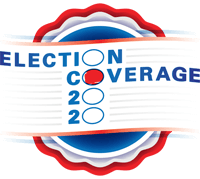2020 Election: The Case For, and Against, Talking Politics at Work
In the throes of this political season, a point-counterpoint

(This article previously appeared on Rewire.org.)

Politics has traditionally been frowned upon as a topic of conversation at work. But, at one time, women weren’t allowed to wear pants at the office — workplace “rules” do change. Does this one hold up in our highly politicized world?
“Political campaigns and election season create a tension between our shared identities as human beings, citizens and workers,” said McClain Watson, clinical associate professor of business communication at The University of Texas at Dallas’ Naveen Jindal School of Management.
And that tension has only gotten more palpable as politics seeps into everything else in our lives.
“As human beings, we want to share our opinions; as citizens, we want to discuss those opinions with others; as workers, we want to keep our jobs and maintain productive relationships with our coworkers,” Watson said. “While our political system and culture require people to share their viewpoints and discuss difficult topics, our need to put food on the table and sustain our families means that we need to be very careful and smart about when and how we have those conversations.”
Most people don’t have the skills to navigate complicated and controversial topics in a nuanced way.
As workplaces have gotten progressively less formal, political talk among coworkers has gotten less taboo, creating a murky gray area. If your workplace doesn’t have a no-political-talk policy, you will have to make your own decisions about how to navigate it.
The Argument for Political Talk
If you approach it respectfully, talking politics “can be an opportunity to learn how to engage with one another around conflicting viewpoints,” said Cheri Torres, a business leadership coach and author of Conversations Worth Having. This can happen “if you can first teach people to learn to stay open, curious and transparent around conflict,” she said.
“The workplace is a primary place where opposing political sides come together to work on something together,” Torres added. “Imagine having conversations where the political dissonance actually helps bring people closer together, helps them better understand one another and perhaps points out to both sides that these subjects are highly complex and can’t be solved with simple or even complicated solutions. Imagine people realizing they don’t have all the information or that their info is skewed.”
The way to keep these conversations civil and productive is to ask “generative questions” — questions for which you don’t have answers and about which you are genuinely curious,” Torres said.
“It’s not a debate, it’s not about advocating hard enough to change someone’s mind … Ask questions to bring out the facts, help people discover what they don’t know … Sometimes people discover they really don’t have info to back up their feelings and they’re not sure where their feelings came from,” said Torres.
If you get pulled into a political discussion, another strategy is to “keep any comments about politics or the election generic and focused on things everyone can agree with,” Watson said.
“For example, ‘Less than half of all registered voters even bother to vote, so I just hope people take the time’ or ‘Obviously, the election is important, but part of me can’t wait for it to be over so we can move on.’ Comments like this enable you to participate in a conversation but won’t risk associating you with either candidate,” Watson said.
The Argument Against Political Talk
Though political conversations at work could be an opportunity for growth and increased understanding across differences, the truth is that most people don’t have the skills to navigate complicated and controversial topics in a nuanced way.
And even though politics is all around us, it’s still a touchy subject. In a 2017 survey by Clutch, a B2B ratings and reviews platform, 12% of employees said they had been made uncomfortable by political expression at work in the past week. In the minds of many, politics and religion remain strictly off the table at work.
It’s better to be blissfully ignorant about your coworkers’ beliefs than to risk hurting important relationships and the company at large, said Andrew Selepak, director of the graduate program in social media at the University of Florida. Making assumptions about another person’s political beliefs — like striking up a political conversation with someone because you assume they agree with you — is a good way to make things awkward for everyone if you guessed wrong.
“There is almost zero reason to engage in a political discussion at work because there is little chance that it will end in a way that will satisfy either person, and more than likely it will cause tension in the office,” Selepak said. “On social media we can pick who we are friends with and who we follow… But we can’t pick our coworkers and we can’t just unfriend them either.”
Apart from the bad feelings that arise from an unnecessary workplace conflict, knowing your coworker disagrees with you politically could cause you to be subconsciously distrustful of them or cause you to avoid them, Selepak said. Neither is good for a team.
Though only 45% of workplaces have an anti-politics policy, more than half of folks who have been uncomfortable at work because of political talk think their workplace should put a policy in place that bans it, the Clutch survey revealed.
In 2016, that’s exactly what North Coast Financial in Oceanside, Calif., did.
“Prior to instating the policy, we experienced a few politically charged discussions that caused unneeded headaches for management and resulted in decreases in office productivity,” said Jeff Hensel, a mortgage broker at the company.
“Regardless of the political topic and opinion, someone is likely to be alienated if their personal beliefs differ. We want our employees to express their political beliefs, but the office is simply not the appropriate venue to discuss these types of issues,” Hensel added.
Ending an Unwanted Conversation
The new rule has helped employees better navigate uncomfortable situations — ”they can end any unwanted political conversations by simply reminding their colleague of the company policy,” Hensel said.
If you want to end a political conversation and your workplace doesn’t have a policy like that, you can do it “in a similar way you would discourage gossip,” said Rosalinda Randall, a workplace civility trainer and author.
Try saying “I learned that it doesn’t pay to discuss ‘X’ at work,” she recommended.
“A more subtle way is to pretend you have to make a call or see someone,” Randall said. “Excuse yourself and walk away.”

